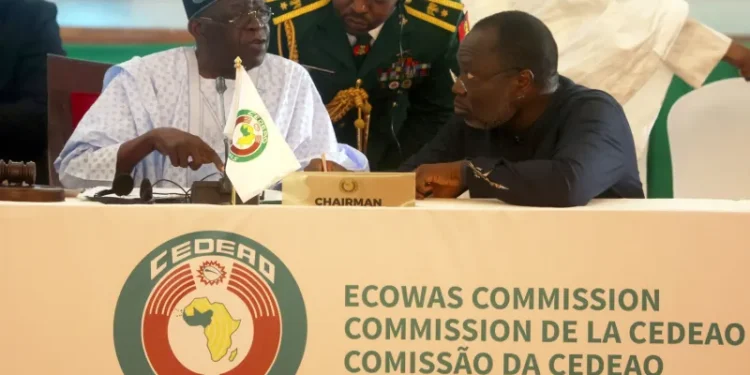The Economic Community of West African States(ECOWAS) has directed the committee of the Chief of Defence Staff to move military personel and materials to Niger Repblic in order to restore constitutional order in the country.
The President of ECOWAS, Omar Alieu Touray made the declaration while reading the resolution of ECOWAS on the Niger coup at the ECOWAS Extraordinary meeting in Abuja on Thursday.
The resolution partly reads, “Direct the committee of the Chief of Defence Staff to activate the ECOWAS stand-by force with all its elements immediately.
“Order the deployment of the ECOWAS stand-by force to restore constitutional order in the Republic of Niger.
“Underscore its continued commitment to the restoration of constitutional order through peaceful means.”
ECOWAS said all efforts made to dialogue with Niger Republic military junta have been defiantly rejected by coup leaders as they condemn continuous detention of President Mohamed Bazoum and his family members.
The details of any eventual military deployment by ECOWAS states and its impact on Niger were not immediately clear.
However, Nigeria’s President Bola Tinubu, who chaired the crisis meeting said, “All is not lost yet” for a “peaceful solution, as a roadmap to restore democracy and stability”, noting, “No option is taken off the table, including the use of force as a last resort.
Before the closed-door talks, Tinubu had insisted that “we prioritise diplomatic negotiations and dialogue as the bedrock of our approach”.
He acknowledged that “the seven-day ultimatum we issued during the first summit has not yielded the desired outcome”.
An attempt this week to send a joint team of ECOWAS, UN and African Union representatives to Niger’s capital Niamey was rejected by the coup leaders.
“We must engage all parties involved, including the coup leaders, in earnest discussions to convince them to relinquish power and reinstate President Bazoum,” he said.
On his part, Ivory Coast’s President Alassane Ouattara noted that the West African bloc “has intervened in the past, in Liberia, in Sierra Leone, in Gambia and Guinea-Bissau” when constitutional order in the countries was threatened.
“Today we have a similar situation in Niger, and I like to say that ECOWAS cannot accept this,” he said.
Speaking before flying to Abuja on Wednesday, Guinea-Bissau’s President Umaro Sissoco Embalo said the future of ECOWAS was at stake following the recent coups among its members.
UN secretary general Antonio Guterres joined a chorus of concern about 63-year-old Bazoum, saying that he and his family were reportedly living in “deplorable living conditions”.
The 15-nation bloc is struggling to stem military takeovers that have now swept through four of its members in three years, potentially heralding fresh instability in a region struggling for years against jihadist insurgences.
But the coup leaders on Thursday signalled further defiance by appointing a new government.
A 21-member cabinet will be headed by Prime Minister Ali Mahaman Lamine Zeine, a civilian, with generals from the new military governing council leading the defence and interior ministries.
The possibility of military intervention in Niger, a fragile nation that ranks among the world’s poorest, sparked debate within ECOWAS and warnings from neighbouring Algeria as well as Russia.
Niger’s neighbours Mali and Burkina Faso, both ruled by military governments that seized power in coups, also warned an intervention would be a “declaration of war” on their countries.
Mali, Burkina Faso and Guinea, also hit by a recent coup, have been suspended from ECOWAS and like Niger were not represented at the Abuja summit.



















